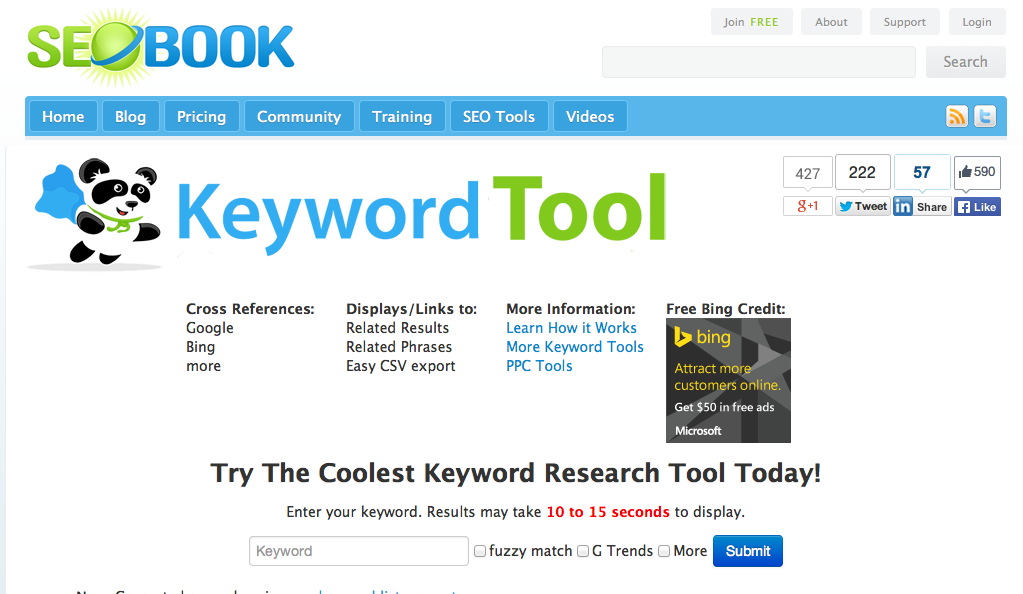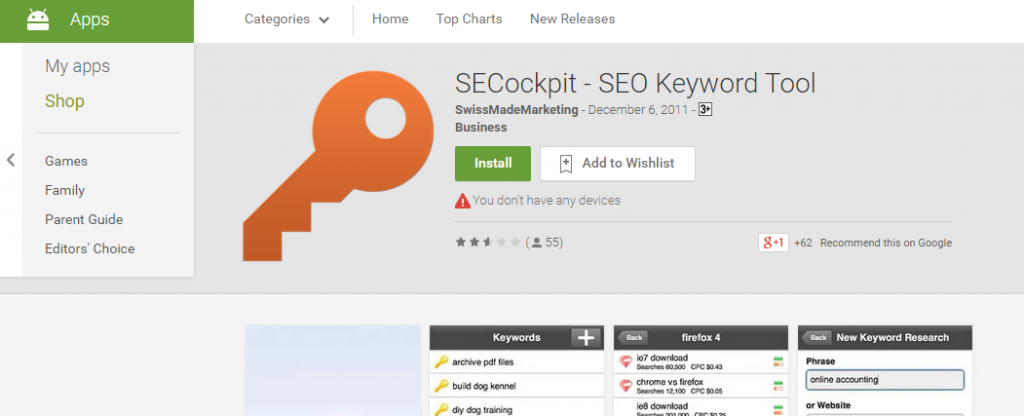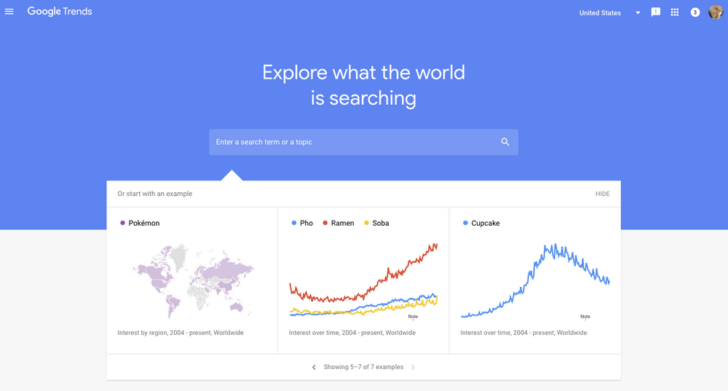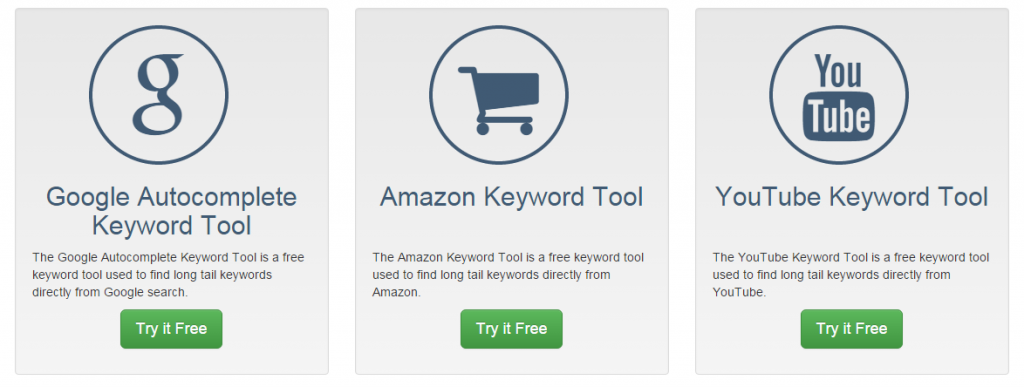Your Guide to SEO Keyword Discovery Tools
Utilizing appropriate keywords during SEO efforts is arguably the most important part of forming your SEO campaign. While keywords are not the be all end all of SEO, they are the building blocks that search engines look for when running their algorithms during a user search.

Appropriate keywords can make or break your search engine results (see how to get to the top of Google). Ensuring that your keywords are optimized, and that the right keywords are being used, will increase your site’s ranking in search engine results.
While optimizing keywords is an ongoing process during your SEO campaign, there are several different tools that can be extremely helpful when planning out your keyword strategies. Before diving into the various resources, it’s important to understand what keywords are meant to provide.
The purpose of a keyword is to increase your rankings on search engines. The goal of any good SEO plan is to have the search engine algorithms see your site as the best possible result for the search that is running. There are several keyword discovery tools that you can utilize to help you plan your campaigns, and you can read about a few SEO keyword tools later in this article.
First, let’s review why looking at the keyword searches your audience uses is important.
Remember – a position on the first page of search engines is the end goal for your SEO efforts.
- The first page of results generally makes up 90% of web traffic, with the first three sites listed pulling in more than 60% of that traffic alone.
- TThe difference between the 10th and 11th place in a result is significant – there is a 100% decrease in traffic just between the 10 and 11 spot.
It is important to remember that good keywords is only a segment of an SEO plan. In order to be successful, you must have all pieces working in unison, and LinksManagement can help you create a customized plan specifically for you and your business!
Tools to optimize keyword discovery
There are a few options to help with optimization of your keyword search. The first is a free keyword research tool, and one that is readily available to anyone with an account.
Google offers the use of “Google Analytics”, which will provide a dashboard of information ranging from site traffic, keyword searches, and more. While this feature is free, and provides (at times too much) a slew of information, it isn’t always as accurate as SEO professionals would prefer.
- The tool that guides keyword selection can provide some results that will raise eyebrows a bit – providing data on how your selected keywords will perform from the standpoint of other searched terms, but not how the keywords will perform on YOUR site. This information proves to be not overly useful when selecting keywords.
- Organic (not paid) search results are no longer included in your reporting. This takes away a huge chunk of relevant information that your SEO administrator needs to create a functioning campaign!
- Google AdWords is your friend. Using this tool will provide information SPECIFIC to YOUR site, which is ultimately where you want your SEO data to come from.
Using AdWords from Google
Don’t be intimidated by the amount of information you’ll receive from your AdWords reporting. It can be daunting to go through each report and attempt to find the information you’re looking for in the many pages of data. However, there are really only certain areas that you should focus on, which we’ll cover in a few moments.
- AdWords works a little differently from standard keyword discovery tools. Generally, we think of keywords as the triggers that kick off a search engine query. It’s the meat of the search, the substance that tells the search engine that your site DOES carry e-commerce, and it should be in these search results.
- A keyword in Google AdWords, however, referrers to a broader sense of the word. Instead of just the single term (think a search for “coffee mugs”), AdWords triggers a search for not only the initial search from the consumer, but will look for misspellings (i.e. “cofee mugs”), synonyms, variations of the word, and more! AdWords tracks all of this in their reporting. This way, you know the clicks, cost, impressions, etc.
- Metrics are tailored specifically to your site with all of these factors included!
How do you sift through all of the information? Great question – narrow your search! It’s extremely easy to fall down the metric rabbit hole when dealing with SEO data. And unless it’s your full time job to sit and measure this data all day, you want to have a focus. In the case of keywords, it’s relatively simple to gather your data.
- Set the date range as large as possible. You want keyword data to span a good chunk of time. This provides accurate data for you to plan your SEO keyword strategy.
- Select “all campaigns” and then “keywords”.
- Here’s where it gets fun. Click “keyword details” and “view all search terms”.
- Now filter. There’s far too much data in this particular query to be of any use, and you will go crazy trying to figure out what to focus on.
Filtering is Important
Get rid of any keyword search results with low impressions. This means that your ad didn’t show up in many results, and you don’t want to target those terms any longer. They’re not working for your campaign. This means not only removing low impressions, but low spend as well (no one is clicking on that ad, get it out of your campaign and move the money to a keyword that works!).
You should now have a manageable file that you can export to excel and truly dive into, pulling important keyword information.
While selecting keywords can seem abstract, the data you filter into your report is actually invaluable to your SEO campaign. Your understanding of how specific keywords are performing is critical to the success of your website. Keep this information in mind when reviewing your extracted data.
- Perform a keyword search.
- Remove low performing keywords from your campaign.
- Keep your competition in mind – what keywords are they using?
- Finalize your list.
While it isn’t ideal to manage keywords manually (it takes a dedicated resource), you do need an SEO expert holding the reigns of this project. They will use the knowledge of your industry, as well as their understanding and expertise of SEO practices to maintain your campaign and produce the best results. There are additional tools that can take some of the manual labor out of this process as well.
Free Keyword Discovery Tools
Here’s where it gets fun. We’re going to show you a few keyword search tools that will make your SEO life just a little easier.
- First up: Google Keyword Planner (Access through Google AdWords Menu)
This feature on Google AdWords actually combines two different tools – Google Keyword and AdWords Traffic Estimator. This is included in your AdWords account, and really allows you to really understand what your audience will search for, and how best to tailor your SEO keywords to these searches. As any marketer will tell you, gaining understanding of your audience and their needs is step one to a successful campaign.
With this tool, you are armed with all the information necessary to create new ad groups and campaigns, AND well on the way to getting your Pay Per Click campaigns optimized for the highest ROI possible.
Using Keyword Planner
The amazing thing about this tool is that you have the ability to tailor it to your immediate needs. After deciding your path for creating ads and ad groups, simple utilize the “wizard” interface on the tool, and pick one of three different options:
- Search for Keyword and Ad Group Ideas
- Enter and Upload Keywords for Estimates
- Multiply keyword lists
The results are provided in a way that even a novice SEO professional can understand, and allows you to export the data. Use this to create your website content, and your keywords are already tailored to your business.
Each path offers it’s own set of benefits. By searching for Keyword Ad Group Ideas, you are trusting Google to provide you with a detailed report that allows you to research and select keywords to add to your AdWords account. It will also provide you with pricing options all in one place!
Filtering keywords is exactly what it sounds like – You get to be extremely choosy about what keywords you want to use in your PPC Campaign. There are several ways to filter the keywords, including based on your competition’s keyword success.
Through the “Estimating keywords “ option, you can upload your own list of keywords (or rely on a list from google) that will offer you the number of searches, hits, impressions, and more to the specific keywords you searched. All of these options have their benefits, and Google provides you ONE place to gain all of this information.
- SEO Book (http://www.seobook.com/)
SEO Book is another SEO keyword tool that offers some great information. You do have to register for an account, but the service you’re utilizing is free.

Using SEO Book
The interface is simple. The tool is simple. The results are powerful.
SEO Book links to the following tools:
- Google Suggest
- Yahoo! Suggest
- Google Trends
- Google Synonyms
- More!
They pull from a database of over 28 million keywords, and provide keywords to you from 3 major databases – all in one form. Use the data that you extract to really dig into the keywords to narrow your focus, and go even further by comparing to your already extracted Google AdWords reports!
- Soovle (www.soovle.com)

Don’t let the interface (or website) fool you. This is another free keyword tool that is perfect when you need keywords on the fly. Enter your keyword or phrase and boom – your results will appear from different sites. Use these to generate keyword rich content when you don’t have time to run comparisons and just need to get content generated.
- SEOCockpit (https://secockpit.com)

SEOCockpit is a paid service (you can try it free for 30 days!), but the information it provides is massive. For $40/mo (starting cost), you will get a keyword selector that gathers data from databases and gives you a report on:
- How your results ranked with your competitors
- Adword CPC rate
- Number of keywords utilized last month
- Google Trends (https://trends.google.com/trends/?geo=US)

Trusty Google has a tool for everything. This free keyword tool was used to track the trend of influenza throughout the country, but don’t let that discourage you from using it for your SEO needs! The trick to this platform is that it plays out real life simulations – which gives you an idea of how events will affect your marketing efforts.
Take the recent US Election – using the election as a base, we can see how this particular event will affect shopping trends from consumers in all areas – which will let you select the best keywords for your campaign, based on events occurring in the world. As internet marketers, we need to have eyes open all the time on the world around our clients, and this is a great way to do just that!
- Keyword Discovery (http://www.keyworddiscovery.com/)

Another tool that allows a free “try before you buy” trial period, but is worth the monthly fee. Keyword Discovery provides you the tool to not only optimize your keywords, but will help you narrow your focus on Pay Per Click Campaigns.
The main goal of SEO is to generate revenue, and by focusing your efforts, you raise your chances of targeting words that customers will interact with, instead of wasting dollars on those they won’t. Keyword Discovery will help you push your ads to be the most profitable for you.
It will also push you toward optimizing your website content with keyword rich text, AND – probably the biggest draw for Keyword Discovery – they will work to provide you with keyword searches that drive traffic to your COMPETITION… something that is invaluable to a marketer. No more asking “how do they get that many clients?” – the answer will be at your fingertips.
- Keyword Spy

What isn’t good about using a database of over 170 million keywords? Not much can get by this search! It does what the other tools do – provides keyword research, but will also give you ROI indicators for each word and term.
You will also learn you site’s spend for AdWords, AND it offers the edge of having your competitors keywords and phrases sent to you as well.
This is a paid service, and can be on the pricey side. However, if you are looking to up the ante on your SEO game, Keyword Spy offers amazing features.
- Keyword Tool Dominator (http://www.keywordtooldominator.com)

Don’t let the long name intimidate you. The Keyword Tool Dominator does what it promises. It delivers, and dominates over the competition. This website is for more experienced SEO Professionals. It provides a complex interface that researchers many different areas. These include:
- Google AutoComplete Keyword Tool
- Amazon Keyword Tool
- YouTube Keyword Tool
- Emulates a real user search
You may have noticed the Amazon Keyword Tool in their offering. For e-commerce websites, Amazon is the holy grail. We all want to bring in the revenue that Amazon brings in, and Keyword Tool Dominator allows you to research what words and phrases are best for Amazon searches – and then incorporate them into your content.
Each tool (Amazon, Google, YouTube) is available for purchase a la carte, or you can pay for the entire three tool suite in one lump sum.
That’s All There is to Keywords
We’ve covered a lot of ground in this article, and barely even scratched the surface of the different tools that are out there to help you with your keyword optimization. SEO is an ever changing science, and the idea that one way will be a cover all for each business is not factual. Answering the question of what the best tool is for your SEO initiatives is one best answered by the experts – you.
Ultimately, you know what is best for your business. You know how to target the customers and get them to buy from you and not the next site on Google. Utilizing these tools that are provided in this article (and others as you see fit) are a supplement to your already completed research.
The importance of keywords will not change any time soon, unless search engines completely overhaul their algorithm formulas. When you start focusing on keywords and how these are tied directly to other SEO forms, you are on your way to creating a successful SEO plan that will work for your business as long as you maintain it!
Remember to be patient, and always look for ways to improve. Stay up to date on latest trends, and don’t be afraid to make change to a campaign that is not working. You could find out how much SEO costs for your website. Your efforts will pay off!
Enter URL & See What We Can Do Submit the form to get a detailed report, based on the comprehensive seo analysis.





